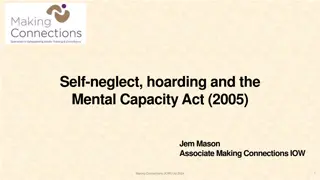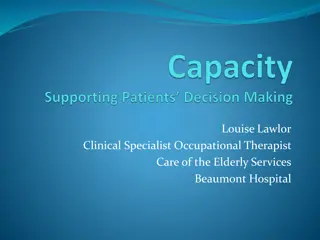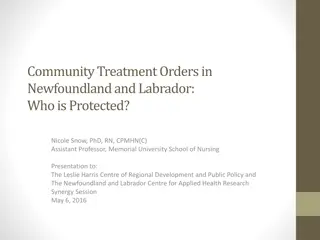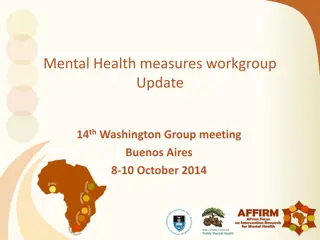Understanding Mental Health Legislation and Capacity Assessments
This content provides information on various aspects of mental health legislation, including the Mental Health Act 1983, the Mental Capacity (Amendment) Act 2019, and the implications for individuals objecting or consenting to treatment. It explores scenarios where different legal provisions apply, such as the availability of MHA, DoLS/LPS authorizations, Court of Protection orders, and the capacity to consent to hospital accommodation. The content also touches on issues related to patients detained under the Mental Health Act, conditional discharges, and exceptions under the legislation. Additionally, it discusses capacity assessments, capacitious refusal overruling, and recognition of advance decisions regarding treatment refusal.
Download Presentation

Please find below an Image/Link to download the presentation.
The content on the website is provided AS IS for your information and personal use only. It may not be sold, licensed, or shared on other websites without obtaining consent from the author. Download presentation by click this link. If you encounter any issues during the download, it is possible that the publisher has removed the file from their server.
E N D
Presentation Transcript
Interface Schedule 1A, Part 1 (DoLS/MHA) Chapter 13 MHA 1983, code of practice Schedule AA1, Part 7 (LPS/MHA) The new Mental Capacity (Amendment) Act 2019, code of practice
Which Act? Individual objects to the proposed accommodation in a hospital for care and/or treatment; or to any of the treatment they will receive there for mental disorder Individual does not object to the proposed accommodation in a hospital for care and/or treatment; or to any of the treatment they will received there for mental disorder Only the MHA is available The MHA is available. Voluntary admission might also be appropriate. Neither DoLS/LPS authorisation or Court of Protection order available Individual has the capacity to consent to being accommodated in a hospital for care and/or treatment Only the MHA is available The MHA is available. DoLS/LPS Authorisation is available, or potentially a Court of Protection order Individual lacks the capacity to consent to being accommodated in a hospital for care and/or treatment
Interface Patients who are detained under the Mental Health Act 1983 or who are objecting to being in hospital for mental health treatment (or to that treatment), cannot be made subject to an authorisation Patients who are in the community or liable to being detained may be made subject to an authorisation providing there is no conflict with the conditions to the community section.
Interface - exceptions A patient who is subject to a conditional discharge who lacks capacity to consent to the conditions that amount to their being deprived of their liberty may be subject to a DoLS/LPS authorisation A patient who is subject to a conditional discharge who has capacity to consent to the conditions that amount to their being deprived of their liberty cannot be conditionally discharged to such circumstances Under LPS It may be possible for a patient detained under the MHA 1983 to have in place a parallel LPS authorisation where this related solely to arrangements to enable their physical healthcare and treatment where there is unrelated to the mental disorder which grounds their detention
Capacity interface MHA sets out times where capacity must be assessed MHA sets out where capacitious refusal can be overruled MHA does not recognise advance decisions to refuse treatment for mental disorder (with the exception of ECT) MHA does not recognise advance decisions to refuse life sustaining treatment for the treatment of mental disorder MHA treatment is limited to treatment for the mental disorder, but does extend to physical disorder which have given rise to the mental disrder or arise as a direct consequence of the mental disorder
But. Chapter 1 MHA code of practice (Principles) Empowerment and involvement Think Principle 2 MCA Purpose and effectiveness Think principle 4 MCA
Scenario Jane has a diagnosis of Emotionally Unstable Personality Disorder (EUPD). She is detained under s.3 MHA. When distressed she self harms, sometimes to extreme extents requiring surgical interventions. When Jane is taken to the local A&E for medical attention, she declines treatment. The surgeon says that Jane has capacity to make this decision.
Scenario Manoj has been living in the community for many years and has not been compliant with his medication for his schizophrenia. HE lives with his family, but this has broken down due to a relapse in his psychosis. He was detained under s.2 MHA during which time he made disclosures of physical abuse by family members. However due to his psychosis he currently does believes his family to be imposters. A safeguarding investigation occurs, but this delays his discharge from hospital. Manoj lacks capacity to make his accommodation and treatment decisions, but the MHA assessment to support regrade to s.3 concluded that he no longer meets the criteria for the MHA. Safeguarding investigation prevents his discharge home
Scenario Jakub has a progressive degenerative neurological condition. As a consequence, he has developed a psychotic depression and detained under s.3 MHA. He usually resides at home with his wife who has been devoted to him and holds LPA (p&a) (h&w) It is recorded in Jakub s clinical notes that he wants to go home and does not want to go to residential care. Due to the deterioration in Jakub s physical health his wife can no longer care for him at home. OT have determined that environmental adaptations are not feasible, and a sufficiently robust care package cannot be put in place to support Jakub and his wife. The only safe option is a specialist residential nursing care provider.
Managing the transition DoLS/LPS Engage with partner agencies On the agenda for your organisation Code of Practice consultation Key departments Professionals Service Users Carers
Workstreams Recording systems data extracts, easy view, storage Training Guesstimate numbers Workforce BIA s, AMCP s, Finance s21ZA appeals, insurance HR contracts, extended roles SLA s partner organisations Policies Administration Communications Governance and Assurance
Next Steps The code of practice The regulations Implementation date? Reform of the Mental Health Act























